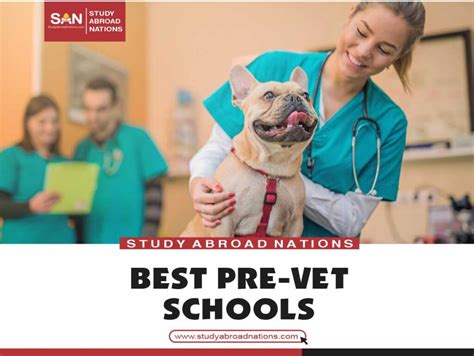Embarking on a Path to Veterinary Medicine

Aspiring veterinarians embark on an arduous journey that demands a robust academic foundation and unwavering passion for animal health. Pre-veterinary programs serve as stepping stones, equipping students with the knowledge and skills essential for admission into veterinary schools.
Benefits of a Pre-Veterinary Program
- Ensure a solid understanding of biology, chemistry, mathematics, and other core subjects crucial for veterinary medicine.
- Gain hands-on experience through internships and shadowing opportunities.
- Access guidance from experienced faculty and mentors in the field.
- Enhance competitiveness for admission to veterinary schools.
Accredited Pre-Veterinary Schools
The American Veterinary Medical Association (AVMA) accredits a select number of pre-veterinary programs, ensuring their standards meet the rigorous requirements for veterinary school preparation. Schools that have earned AVMA accreditation include:
| Institution | Location | Website |
|---|---|---|
| University of California, Davis | Davis, CA | vetmed.ucdavis.edu |
| Cornell University | Ithaca, NY | vet.cornell.edu |
| Iowa State University | Ames, IA | vetmed.iastate.edu |
| Michigan State University | East Lansing, MI | cvm.msu.edu |
| Oregon State University | Corvallis, OR | vetmed.oregonstate.edu |
Curriculum and Coursework
Pre-veterinary programs typically offer a structured curriculum that includes a balance of core science courses, animal science electives, and general education classes. Common core requirements include:
- Biology
- Chemistry (inorganic, organic, and biochemistry)
- Physics
- Mathematics (calculus, statistics)
- English
- Social sciences
Extracurricular Activities and Experiences
Beyond coursework, pre-veterinary programs encourage active participation in extracurricular activities that enhance students’ practical knowledge and prepare them for veterinary school. These may include:
- Club memberships (e.g., Pre-Veterinary Club, Animal Science Club)
- Shadowing veterinarians
- Volunteering at animal shelters or rescue organizations
- Conduct research and present findings
Tips for Success in Pre-Veterinary Programs
- Maintain a high GPA: Veterinary schools consider cumulative GPAs as a key admission factor.
- Take challenging coursework: Enroll in Honors or AP classes to demonstrate academic rigor.
- Gain animal experience: Secure internships, volunteer positions, or work at animal care facilities.
- Shadow veterinarians: Build relationships with professionals and observe veterinary practices firsthand.
- Get involved in extracurricular activities: Join clubs, conduct research, or participate in outreach programs.
- Research veterinary schools: Learn about different schools, their requirements, and application deadlines.
- Seek guidance from advisors: Utilize resources within your pre-veterinary program to navigate the path to veterinary medicine.
Frequently Asked Questions
- Are pre-veterinary programs competitive? Yes, admission into pre-veterinary programs and veterinary schools is highly competitive.
- What is the average acceptance rate to veterinary schools? The acceptance rate varies widely among different schools, ranging from 5% to 35%.
- What are the job prospects for veterinarians? The Bureau of Labor Statistics projects a 19% growth in veterinary jobs by 2031.
- Is it possible to get into veterinary school without a pre-veterinary program? Yes, but it is more challenging. Many students who do not pursue a formal pre-veterinary program take additional science and animal science courses to compensate.
Conclusion
Pre-veterinary programs offer a structured pathway for students to prepare for the rigors of veterinary school and a career in veterinary medicine. By providing a solid foundation in core science, hands-on experience, and extracurricular opportunities, these programs empower students to succeed in this competitive field.
